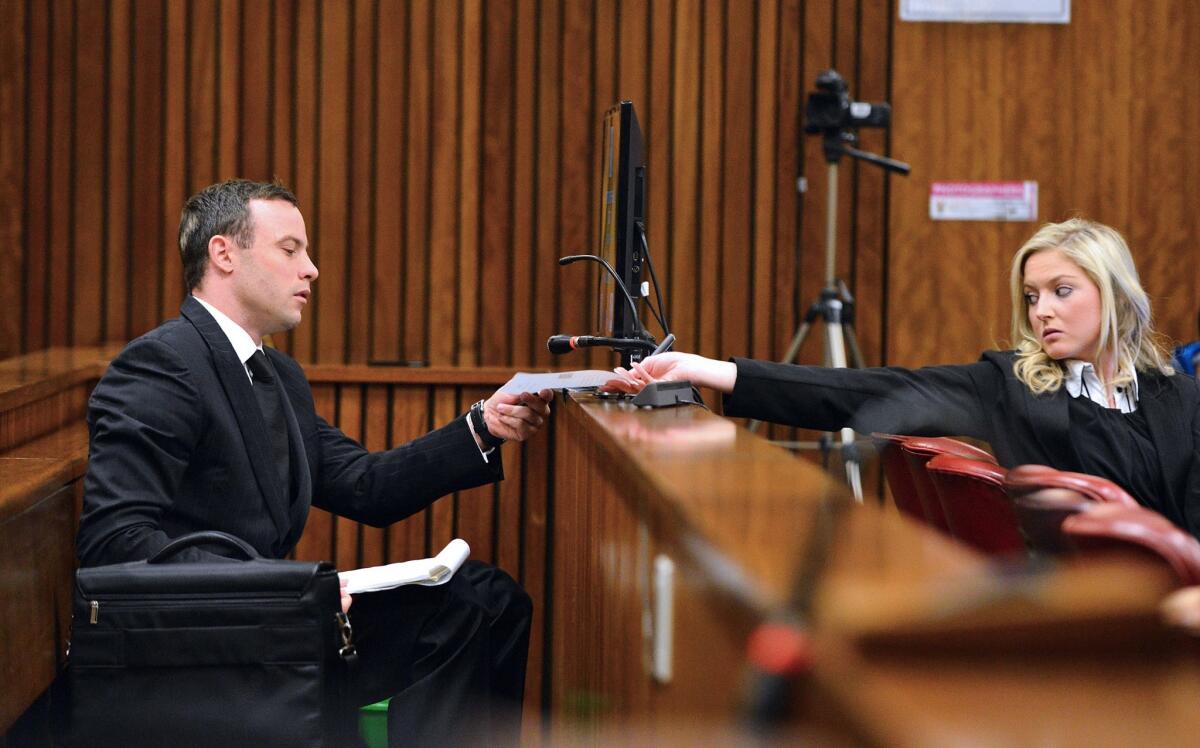Oscar Pistorius ‘did not suffer from a mental illness,’ report says

- Share via
Reporting from Johannesburg, South Africa — South African double-amputee Olympian Oscar Pistorius did not have a mental disorder when he killed his girlfriend, Reeva Steenkamp, according to a psychiatric report presented at his murder trial Monday.
The trial resumed Monday after the court had sent Pistorius for a psychiatric assessment six weeks ago. Judge Thokozile Masipa had ruled the assessment was necessary after Pistorius’ defense advocate, Barry Roux, led with evidence suggesting that the athlete had for years suffered generalized anxiety disorder, which may have affected his behavior the night of the shooting.
But the report said there was no mental disorder that affected his understanding of right and wrong on Valentine’s Day last year, when Pistorius fired four shots into a toilet cubicle in his bathroom, killing Steenkamp.
“Mr. Pistorius did not suffer from a mental illness or defect that would have rendered him criminally not responsible for the offense charged,” the report said, according to the prosecution.
The defense and prosecution accepted the results of the report, which was not presented in its entirety in court.
The prosecution argues that Pistorius and Steenkamp quarreled in the early hours of the morning, she fled into the toilet, and that Pistorius shot her four times with expanding bullets designed to cause maximum tissue damage.
But Pistorius says he mistook her for an intruder when he opened fire.
Pistorius could still face conviction for murder if the court finds that he knowingly fired into the cubicle, believing that four shots would likely kill anyone in there, including an intruder.
His defense team has argued that Pistorius, whose legs were amputated as a baby because of a disability, felt extremely vulnerable without his prosthetic legs and that this helped explain his behavior on the night of the shooting.
Dr. Gerry Versfeld, the doctor who amputated Pistorius’ lower legs because he was born without fibula bones, testified Monday that the athlete had difficulty balancing on his stumps. Pistorius suffered pain and often fell or was knocked over by his dogs, he testified, quoting Pistorius.
Versfeld’s evidence added to the picture of a man who felt highly vulnerable without his prosthetic legs and who believed he didn’t have the option to flee on the night he says he imagined intruders were in his bathroom.
It also suggests that Pistorius wouldn’t have been able to bash down the toilet door with a cricket bat while on his stumps, as the prosecution case claims.
As part of the defense case, Pistorius removed his prosthetic legs in the court and showed his stumps to the judge as the doctor demonstrated the softness of the tissue on the underside of his stumps.
“On his stumps, he is severely vulnerable in a dangerous situation and severely impaired walking and turning,” Versfeld testified.
Pistorius’ defense team also says that the crime scene was tampered with by police. It has argued that key pieces of evidence, including the toilet door through which Pistorius fired, were mishandled.
Roux on Monday focused on a power cord missing from the crime scene. He said there were photographs that showed the cord present one day but missing the next.
Prosecutor Gerrie Nel was forced to admit that the cord was missing and couldn’t be located and that it had never been recorded on a police inventory of the crime scene.
Earlier in the case, police admitted that a valuable watch belonging to Pistorius was stolen from the crime scene when police were present.
Judge Masipa said she was “very concerned” about the missing cord, which she saw as important to the case. Earlier in the trial prosecutor Nel argued that it wasn’t long enough to reach the socket where Pistorius claimed it was plugged in.
Masipa ordered that the policeman responsible for sealing the house provide an explanation for the whereabouts of the missing cord.
The defense also called an acoustics expert, Ivan Lin, who testified it was unlikely that neighbors who lived 193 yards from Pistorius’ house could have heard Steenkamp screaming from inside a locked toilet cubicle.
One key state witness, Michelle Burger, testified she heard a woman screaming the night Steenkamp was killed.
For more news from Africa, follow @latimesdixon on Twitter
More to Read
Sign up for Essential California
The most important California stories and recommendations in your inbox every morning.
You may occasionally receive promotional content from the Los Angeles Times.










